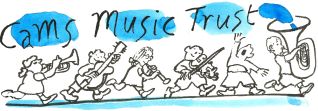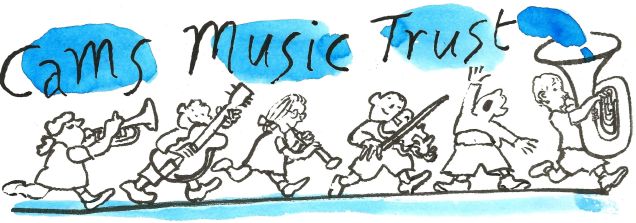CMT Trustees endeavour to:
- make sure all trustees, employees, volunteers and beneficiaries know about safeguarding and people protection
- have appropriate policies and procedures in place
- check that people are suitable to act in their roles
- make sure all trustees, employees, volunteers and beneficiaries know about safeguarding and people protection
- have appropriate policies and procedures in place
- check that people are suitable to act in their roles
- spot and refer or report concerns
- have a clear system of referring or reporting to relevant organisations as soon as they suspect or identify concerns
- set out risks and how they will manage them in a risk register which is regularly reviewed
- be quick to respond to concerns and carry out appropriate investigations
- not let one trustee dominate their work – trustees will work together
Trustees will be alert to:
- sexual harassment, abuse and exploitation
- negligent treatment
- physical or emotional abuse
- bullying or harassment
- health and safety
- commercial exploitation
- extremism and radicalisation
- forced marriage
- child trafficking
- female genital mutilation
- discrimination on any of the grounds in the Equality Act 2010
- people may target your charity
- a charity’s culture may allow poor behaviour
- people may abuse a position of trust they hold within a charity
Trustees acknowledge that if things go wrong, the Charities Commission will check to see if the guidance and the law have been followed.
Trustees undertake to ensure that safeguarding policies and procedures will be:
- put into practice
- reviewed at least once a year
- made available to the public
Trustees will ensure that all trustees, staff, volunteers and beneficiaries are aware of CMT policy.
Code of conduct
CMT’s code of conduct sets out:
- CMT’s culture
- how people in your charity should behave.
Health and Safety
Including first aid, fire safety and digital safety policies that everyone can understand
Checks on Trustees, Staff and Volunteers
CMT will obtain:
- checks on trustees, staff and volunteers
- must make sure that trustees, staff and volunteers are suitable and legally able to act in their positions. This includes people from or working overseas.
To the above ends, CMT will obtain:
- criminal records checks where the position is eligible
- references and checks on gaps in work history
- confirmation that staff can work in the UK
- health checks where appropriate
- Disclosure and Barring Service (DBS) checks
- Because we work with children, people’s criminal records and information held by the police.
- All checks available from the Disclosure and Barring Service (DBS) – including always getting a standard, enhanced or enhanced with barred list check from the DBS when a role is eligible for one.
- if a role is not eligible for a standard or enhanced check, the person to apply for a basic check.
- Appropriate checks for people from overseas
- get an International Child Protection certificate (if possible) when sending workers overseas where we cannot get a DBS check for someone going to work overseas, they may be able to
CMT will not appoint anyone who is disqualified as a trustee or to a senior manager position (at chief executive or finance director level).
Protecting Volunteers and Staff
CMT has clear policies and procedures on:
- bullying and harassment
- whistleblowing
CMT has adequate insurance which covers the individuals and the activities involved
Safeguarding children or adults at risk
1. Children
Because CMT works with children we have an extensive Safeguarding and Child Protection Policy.
Legal framework
This policy has been drawn up on the basis of legislation, policy and guidance that seeks to protect children in England/Northern Ireland/Scotland/Wales [select the relevant nation]. A summary of the key legislation and guidance is available from nspcc.org.uk/child protection.
We believe that:
- children and young people should never experience abuse of any kind
- we have a responsibility to promote the welfare of all children and young people, to keep them safe and to practise in a way that protects them.
We recognise that:
- the welfare of the child is paramount
- all children, regardless of age, disability, gender reassignment, race, religion or belief, sex, or sexual orientation have a right to equal protection from all types of harm or abuse
- some children are additionally vulnerable because of the impact of previous experiences, their level of dependency, communication needs or other issues
- working in partnership with children, young people, their parents, carers and other agencies is essential in promoting young people’s welfare.
We will seek to keep children and young people safe by:
- valuing, listening to and respecting them
- appointing a nominated child protection/safeguarding lead, a deputy child
- protection/safeguarding lead and a lead trustee/board member for safeguarding
- developing child protection and safeguarding policies and procedures which reflect best practice
- using our safeguarding procedures to share concerns and relevant information with agencies who need to know, and involving children, young people, parents, families and carers appropriately
- creating and maintaining an anti-bullying environment and ensuring that we have a policy and procedure to help us deal effectively with any bullying that does arise
- developing and implementing an effective online safety policy and related procedures
- sharing information about child protection and safeguarding best practice with children, their families, staff and volunteers via leaflets, posters, group work and one-to-one discussions
- recruiting staff and volunteers safely, ensuring all necessary checks are made
- providing effective management for staff and volunteers through supervision, support, training and quality assurance measures
- implementing a code of conduct for staff and volunteers
- using our procedures to manage any allegations against staff and volunteers appropriately
- ensuring that we have effective complaints and whistleblowing measures in place
- ensuring that we provide a safe physical environment for our children, young people, staff and volunteers, by applying health and safety measures in accordance with the law and regulatory guidance
- recording and storing information professionally and securely.
Related policies and procedures
This policy statement should be read alongside our organisational policies and procedures, including:
2. Adults
Safeguarding duties for adults at risk apply to CMT working with anyone aged 18 or over who:
- has needs for care and support (whether or not the local authority is meeting any of those needs) and
- is experiencing, or is at risk of, abuse or neglect
- as a result of those care and support needs is unable to protect themselves from either the risk of, or the experience of abuse or neglect.
An adult at risk of abuse may:
- have an illness affecting their mental or physical health
- have a learning disability
- suffer from drug or alcohol problems
- be frail
Working overseas
Trustees will make every effort to:
- be aware of different risks for staff, volunteers and beneficiaries who are overseas
- have suitable reporting and monitoring processes in place for any work overseas
Trustees acknowledge that there are specific challenges of working overseas including:
- different cultures, practices or legal systems
- an unstable environment, like a conflict zone
- working with many partners
Trustees undertake to
- apply the same practices as in England and Wales and make sure CMT complies with any extra requirements of the other country.
- to report relevant issues to law enforcement in the country you are working in
- to report relevant issues to police in the UK
Handling and reporting incidents and allegations
In handling and reporting incidents and allegations Trustees undertake to:
- handle and record incidents and/or allegations of abuse in a secure and responsible way, following our safeguarding policy and procedures.
- report to the police if the incident or concern involves criminal behaviour. As such, CMT undertakes to follow Charities Commission guidance ‘Criminal reporting of safeguarding offences including overseas v3.’
- where necessary, refer to social services and report to other agencies.
- send a serious incident report to the Charity Commission – in some cases
- refer all children and adults at risk safeguarding concerns to our local safeguarding children or adult team and, where appropriate, to DBS.
Last reviewed: 14th Aug 2019
Like Us On Facebook


